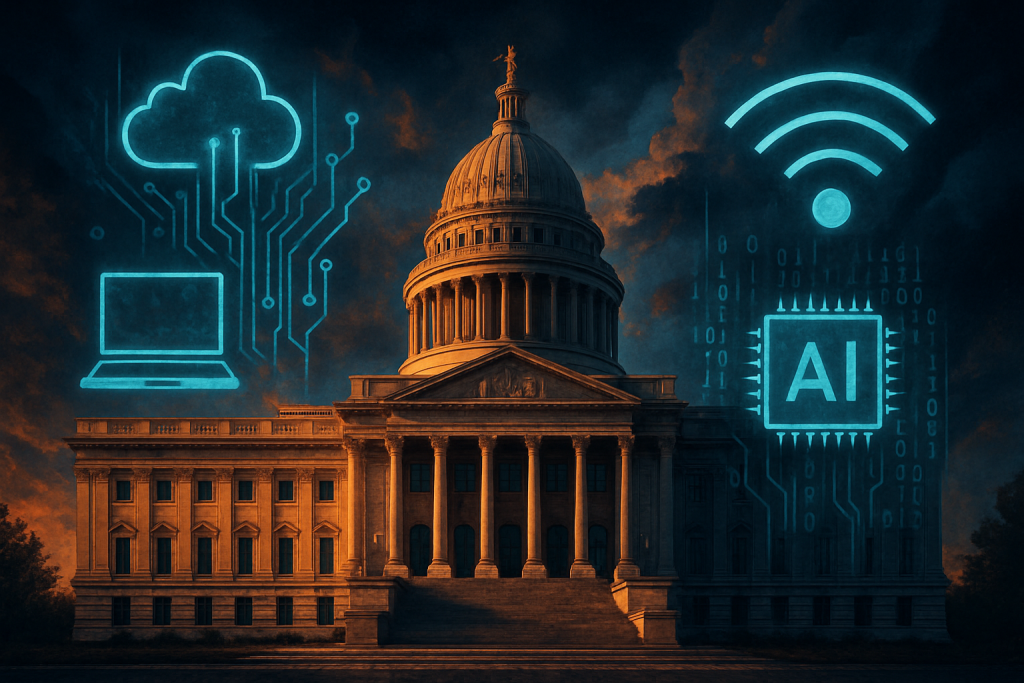The year is 2025. Flying cars are still just a pipe dream, but AI? AI is everywhere. From generating personalized cat videos to autonomously piloting delivery drones, it’s woven into the fabric of our lives. But with great power, as Uncle Ben famously told Peter Parker, comes great responsibility. And that’s where things get tricky, especially when figuring out who’s in charge of the rules.
Yesterday, July 1st, the U.S. Senate delivered a monumental blow to Big Tech’s ambitions for centralized AI governance, voting a resounding 99-1 to axe a proposed 10-year federal ban on state-level AI regulation. The ban, initially tucked away within President Trump’s “One Big Beautiful Bill” (yes, that’s really what they called it), aimed to establish a nationwide moratorium, effectively preventing individual states from enacting their own AI laws. Think of it as preemptive federal supremacy, Silicon Valley style.
Why did this seemingly innocuous provision spark such a firestorm? Let’s rewind a bit.
The push for federal AI oversight isn’t new. Companies like OpenAI (the folks behind the groundbreaking, or potentially world-ending, depending on your perspective, GenAI models) and Google have long advocated for a unified national framework. Their argument? A patchwork of state-level regulations would create a compliance nightmare, stifle innovation, and ultimately leave the U.S. lagging behind in the global AI race. Imagine trying to navigate a self-driving car across state lines if each state had its own unique traffic laws and sensor requirements. Chaos, right?
But the allure of streamlined regulations couldn’t mask the underlying concerns. Critics, a bipartisan coalition of senators and consumer advocates, argued that the ban would essentially hand AI companies a blank check, allowing them to operate with minimal oversight and potentially unleash unforeseen harms on unsuspecting citizens. They painted a picture of unchecked algorithms making biased decisions in healthcare, finance, and even criminal justice, all while states stood powerless to intervene. It’s the plot of a dystopian sci-fi movie, only this time, the robots are spreadsheets.
Senator Marsha Blackburn (R-TN), a name you might recognize from her past stances on tech regulation, emerged as a vocal opponent of the ban. Initially, she had co-authored a shorter, five-year version of the moratorium. But somewhere along the line, she had a change of heart. She argued that states needed the flexibility to protect their citizens, particularly given the absence of comprehensive federal AI legislation. This wasn’t just about states’ rights; it was about the right to protect people from potentially rogue algorithms. Blackburn even cited concerns about the “unchecked power of Big Tech,” a phrase that’s become increasingly common in Washington D.C. these days.
The Senate’s near-unanimous vote speaks volumes. It’s a clear signal that lawmakers are wary of ceding too much control over AI to the federal government, especially when it comes at the expense of state autonomy. It also reflects a growing distrust of Big Tech, fueled by years of data breaches, privacy scandals, and allegations of anti-competitive behavior. Remember Cambridge Analytica? Yeah, Congress remembers too.
So, what does this mean for the future of AI regulation? Here’s the breakdown:
First, states can now continue to develop and implement their own AI laws. We’re likely to see a flurry of activity in state legislatures across the country, with different states taking different approaches to regulating everything from facial recognition to automated loan applications. California, known for its progressive tech policies, is likely to be a leader in this area, while other states may take a more cautious approach.
Second, the debate over federal AI regulation is far from over. While the Senate rejected the ban, the need for some level of national coordination remains. The challenge will be finding a balance between promoting innovation and protecting consumers, a tightrope walk that will require careful consideration and collaboration between lawmakers, industry experts, and civil society groups. This could mean future federal legislation focused on specific areas like data privacy or algorithmic transparency, leaving states to fill in the gaps.
Third, this decision has significant financial implications. For AI companies, navigating a patchwork of state regulations will undoubtedly increase compliance costs. They’ll need to invest in legal teams and compliance infrastructure to ensure they’re meeting the requirements of each state in which they operate. This could potentially slow down the pace of innovation, particularly for smaller startups that lack the resources to navigate a complex regulatory landscape. On the other hand, it could also incentivize companies to develop more responsible and ethical AI systems from the outset.
Finally, this vote raises profound ethical and philosophical questions about the role of AI in society. Who gets to decide how AI is developed and deployed? What values should guide its development? How do we ensure that AI benefits all of humanity, not just a select few? These are questions that we, as a society, need to grapple with as AI continues to evolve. The Senate’s decision is just one small step in a much larger conversation.
In the end, the Senate’s move to strike the AI regulation ban is a victory for states’ rights, a testament to the growing skepticism surrounding Big Tech, and a reminder that the future of AI is still very much up for grabs. As we move forward, it’s crucial that we engage in a thoughtful and informed debate about how to harness the power of AI for good, while mitigating its potential risks. The stakes are simply too high to leave it to the robots or, worse, the lobbyists.
Discover more from Just Buzz
Subscribe to get the latest posts sent to your email.


